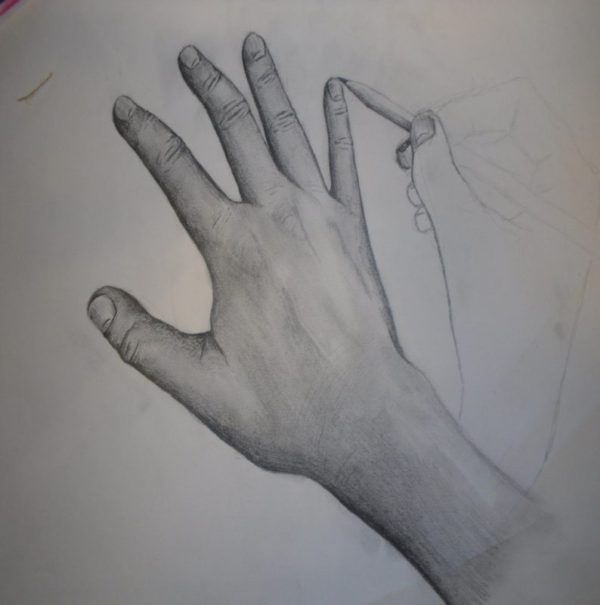The kids in my upper-elementary writing workshops all hate revision. In fact, they seem to have blocked the word out of their Mindcrafty minds. Whenever I mention “revising,” I get blank stares. If I press the kids to jostle their memories, some might offer up explanations like, “That’s where you fix the red underlines.”
Sigh.
When I remind them that Grammarly is not going to save them here, that revision is something actual humans still need to do by hand and brain, that it’s way more about making meaning than marks, they’re all, “Oh, yeah, that.”
In my search for ways to make the revision workshop more fun and engaging, I discovered lots of different ways the same thing can be a drag.
Peer reviewing was a mixed bag that worked well with kids who were already engaged but got perfunctory and rote with reluctant writers. Just another hoop to jump through. Directions to weed out be verbs led to some painful contractions. Kids who were motivated and full of ideas when they began a project now spent writing time looking for ways to disguise “is” in apostrophes. (“She’s nice” instead of “She is nice.” Look, Ma, no be verb!)
As with every teaching challenge, there is no magic bullet here, but there are a few okay-working ones that, together, shoot things in the right direction. Which brings me to the topic of this piece: the gamification of revision.
Initially, the idea rubbed me the wrong way. It seemed like gimmicky fluff, but after experimenting with a few different platforms (Kahoot, Formative, and Flipgrid), I hit the jackpot with Quizizz and became a convert.
The Winning Formula
Quizizz is an online learning platform where teachers can create interactive quizzes that students play, game show-style. When we play the Revision Game, I don’t call it that. I call it “Workshopping a draft.” Each time an author is ready to share their work with the class for feedback, I build a few Quizizz questions around passages from their draft in progress.
The approach works best for micro-level revisions around bumpy syntax, but you can also use the Quizizz polling feature to kickstart discussions about big-picture questions (plot, motive, conflict).
The enemy of successful gamification is isolation. Group brainstorming, discussion, and give and take are all part of the game here. Revision is about nuance. There are often many “right” answers, each with a slightly different shade of meaning. This sort of revising is as much about community-building as it is about writing.
The Rules of Play
At a student author’s first glimmer of a revision success, I ask them if they’d like to workshop their draft on Quizizz. Most are eager for the hot seat because, in some ways, it’s also a throne. They always have the option of anonymity, but no one ever wants it, probably because I showcase their success front and center.
For the first question, I spend a minute digging through their Google Doc’s revision history for an earlier version of a line or two they’ve done a good job revising, then create a multiple-choice question that asks kids to spot the strongest revision. I write two other weaker revisions and use the actual revision as the correct answer. This way, the student(s) workshopping their draft get to shine as writers with chops.
Here’s an example from the Quizizz I created to workshop an earlier draft of “Caught,” a graphic poem a group of fourth- & fifth-graders wrote as part of a mentor poet study using work by Ocean Vuong and Denis Johnson.

Choice two is the student’s actual revision and the correct answer here. (The issue was verb tense. The meteor is coming in the future, but #3 has the narrator in the present.)
For times when second language learners get stuck on tiny usage issues (usually with connecting words and prepositions), I give them a few options to “experiment” with until they find one that “sounds” right, like in this example:

After everyone posts a suggestion, we discuss and tweak ideas until we find a revision that works.
Below is the polished revision the class came up with for the first question above, along with the illustration it appears with in the published graphic poem, Caught. The phrase “. . . even though it won’t stop the devouring” was a classmate’s suggestion, and the poets ran with it!

This kind of revising may seem time consuming and roundabout, but I think, in the long run, it saves time by skipping all the lag and drag my old revision methods seemed to incubate. The small but quick successes boost engagement and keep the creative momentum going.
Robyn Carter is a writer, curriculum designer, and educator who’s been teaching writing to tweens for twenty years, most recently as a San Francisco WritersCorps Teaching Artist in Residence at a public elementary school in the City’s Tenderloin Neighborhood. Her ed writing has appeared in KQED In the Classroom, and Teachers & Writers Magazine. Find her fiction in Conjunctions, Ninth Letter, Prime Number Magazine, and other journals.




